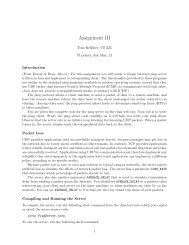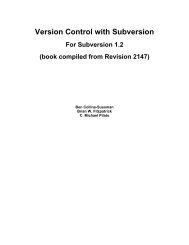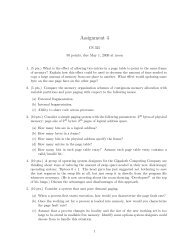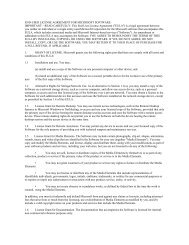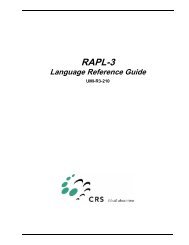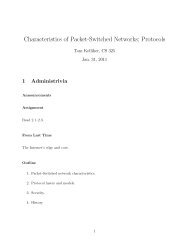Flesh and Machines - Phoenix Goucher
Flesh and Machines - Phoenix Goucher
Flesh and Machines - Phoenix Goucher
Create successful ePaper yourself
Turn your PDF publications into a flip-book with our unique Google optimized e-Paper software.
around us, despite their verbal reports, are not experiencing consciousness in the same way we do.<br />
Once we extend this questioning to other animals, to orangutans, to dogs, to mice, to birds, to lizards, <strong>and</strong> to insects,<br />
we get progressively less sure of just how much consciousness they possess. Some people like to deny any hint of<br />
consciousness to any animals but ourselves. It becomes much more acceptable to slaughter whales for meat, or<br />
scientific research, or whatever happens to be the current rationale, if they are totally unconscious. It is also<br />
comforting to our sense of specialness if we alone are conscious.<br />
In my opinion we are completely prescientific at this point about what consciousness is. We do not exactly know<br />
what it would be about a robot that would convince us that it had consciousness, even simu lated consciousness.<br />
Perhaps we will be surprised one day when one of our robots earnestly informs us that it is conscious, <strong>and</strong> just like I take<br />
your word for your being conscious, we will have to accept its word for it. There will be no other option.<br />
Ethical Slaves?<br />
One of the great attractions of robots is that they can be our slaves, Mindlessly they can work for us, doing our<br />
bidding. At least this is one of the versions we see in science fiction.<br />
But what if the robots we build have feelings? What if we start empathizing with them. Will it any longer be ethical<br />
to have them as slaves? This is exactly the conundrum that faced American slave owners. As they or their northern<br />
neighbors started to give humanhood to their slaves, it became immoral to enslave them. Once the specialness of<br />
European lineage over African lineage was erased, or at least blurred, it became unethical to treat blacks as slaves.<br />
They, but not cows or pigs, had the same right to freedom as did white people. Later a similar awakening happened<br />
concerning the status of women.<br />
Fortunately we are not doomed to create a race of slaves that is unethical to have as slaves. Our refrigerators work<br />
twenty-four hours a day seven days a week, <strong>and</strong> we do not feel the slightest moral concern for them. We will make<br />
many robots that are equally unemotional, unconscious, <strong>and</strong> unempathetic. We will use them as slaves just as we use<br />
our dishwashers, vacuum cleaners, <strong>and</strong> automobiles today. But those that we make more intelligent, that we give<br />
emotions to, <strong>and</strong> that we empathize with, will be a problem. We had better be careful just what we build, because we<br />
might end up liking them, <strong>and</strong> then we will be morally responsible for their well-being. Sort of like children.<br />
Further Reading<br />
Brooks, R. A. 2001. "The Relationship Between Matter <strong>and</strong> Life." Nature 409: 409-11.<br />
Chalmers, D. 1996. The Conscious Mind. New York: Oxford University Press.<br />
Lipson, H., <strong>and</strong>J. B. Pollack. 2000. "Automatic Design <strong>and</strong> Manufacture of Robotics Lifeforms," Nature 406: 974-<br />
78.<br />
Maturana, H. R., <strong>and</strong> E J. Varela. 1987. The Tree of Knowledge: The Biological Roots of Human Underst<strong>and</strong>ing.<br />
New Science Library. Boston: Shambhala Publications.<br />
Nolfi, S., <strong>and</strong> D. Floreano. 2000. Evolutionary Robotics. Cambridge, Mass.: MIT Press.<br />
Penrose, R. 1989. The Emperor's New Mind. New York: Oxford University Press.<br />
————. 1994. Shadows of the Mind. New York: Oxford University Press.<br />
Ray, T. S. 1991. "An Approach to the Synthesis of Life." In Artificial Life II. Edited by C. G. Langton. Redwood<br />
City, Calif.: Addison-Wesley<br />
Rosen, R. 1991. Life Itself. New York: Columbia University Press.<br />
Searle,J. R. 1992. The Rediscovery of the Mind. Cambridge, Mass.: MIT Press.



